The sculptural sails of the Sydney Opera House reflect across the waters of the Sydney Harbour in New South Wales, Australia. The reflections capture the shapes of a cluster of gleaming white sail-shaped shells that are the roof structure of a multi-purpose performance complex. The Opera House is not just one of the most photographed buildings in the world; it is also the subject of many works of art and, at times, becomes a site of installation artwork. It is an ever-changing artwork that reflects Sydney's and Australia's cultural life.

Sydney Opera House - Icon of Australia
by Jo_Murphy
What do you think of first when you think of Australia? Is it the iconic form of the Sydney Opera House overlooking the Sydney Harbour, with white sail shapes flying?
Who Designed the Opera House?
Jørn Utzon AC created an original and controversial design.
In 1955, Bennelong Point was declared the site for the proposed new opera house. In 1956, Premier Cahill released an international competition for "a National Opera House at Bennelong Point." The competition fee was 10 Australian pounds. 10 dollars in 1956 are equivalent to 201.06 dollars in 2023 and so 10 Australian pounds would have been $400. (inflationtool.com )
A Danish architect, Jørn Utzon AC, created his entry from his modest office in Hellenbaek, north of Copenhagen and sent 12 drawings. His was one of 223 entries received from 28 countries. Utzon AC's design was chosen for its originality and controversial nature.
The innovative design is a complex that offers two main halls, situated side by side, facing out to the harbour on a large area that now hosts outdoor concerts. On the top of each hall is a row of sail-shaped panels that serve as a roof and wall. The intention was to create this innovative structure from precast concrete. The largest venue of the multipurpose performing arts facility is the 2,679-seat Concert Hall, and it is a magical space where large audiences patronise choir performances, symphony concerts, and popular music shows. There is an Opera Theatre for opera and dance performances, including ballet. Joan Sutherland will always be remembered as Australia's operatic soprano, so this building became The Joan Sutherland Theatre as a tribute to her in 2012. It can house 1,500 people. There are spaces for stage plays, film screenings, and smaller musical performances. On the southeastern end of the Opera House, there is a space where outdoor performances happen, and this idea of creating art outside the Opera House becomes attractive when the Vivid Festival takes hold of the imagination of music and art lovers worldwide. Restaurants and a professional recording studio cater to this festival atmosphere. Unsurprisingly, The Opera House became a UNESCO World Heritage site in 2007.
The Mathematics of the Sydney Opera House
Eddie Woo
Parabolic, ellipsoid and finally spherical geometry
big words to describe a simple design
The roof design for the Sydney Opera House evolved through various iterations as Utzon and his team pursued parabolic, ellipsoid and finally spherical geometry to derive the final form of the shells. The eventual realisation that the form of the Sydney Opera House's shells could be derived from the surface of a sphere marked a milestone in 20th century architecture. The Spherical Solution
Let's break that down........
Think back to the Greeks and their Greek columns, without mortar the columns were manipulated to support the whole structure. Very tricky.
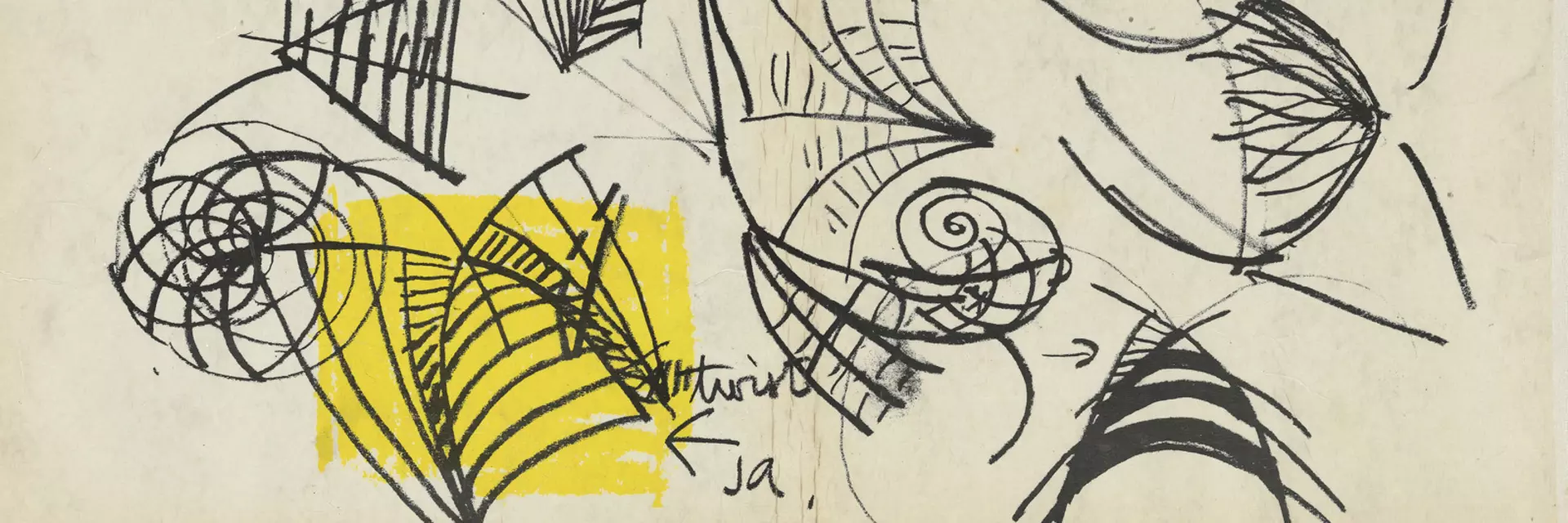
The Sydney Opera House was also tricky to design and tricky to build. And the tricky nature of achieving an outlandish idea was quite controversial at the time.
Matters began to turn against Utzon in 1962. His Spherical Solution for the roof had been approved but the cost of the building – estimated at just 3.5 million pounds when construction began in 1959 – was increasing. By the middle of 1962, the estimated cost had hit 13.7 million pounds. Read more here...Utzon Departs the House
Innovative Installation Space
The Sydney Opera House sails are the perfect surface for light installation and the water reflects this ingenuity
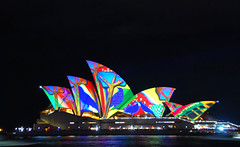 Opera House_Vivid Colour |  Vivid Sydney - Sydney Opera House |
 Sydney Opera House During Vivid Festival | 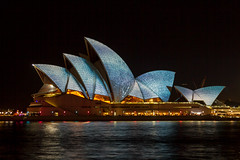 Vivid Sydney Opera House |
Shannon Steele who works for Opera Australia says.....
it's about lights, beauty and crowds.
You can see the light installations above.
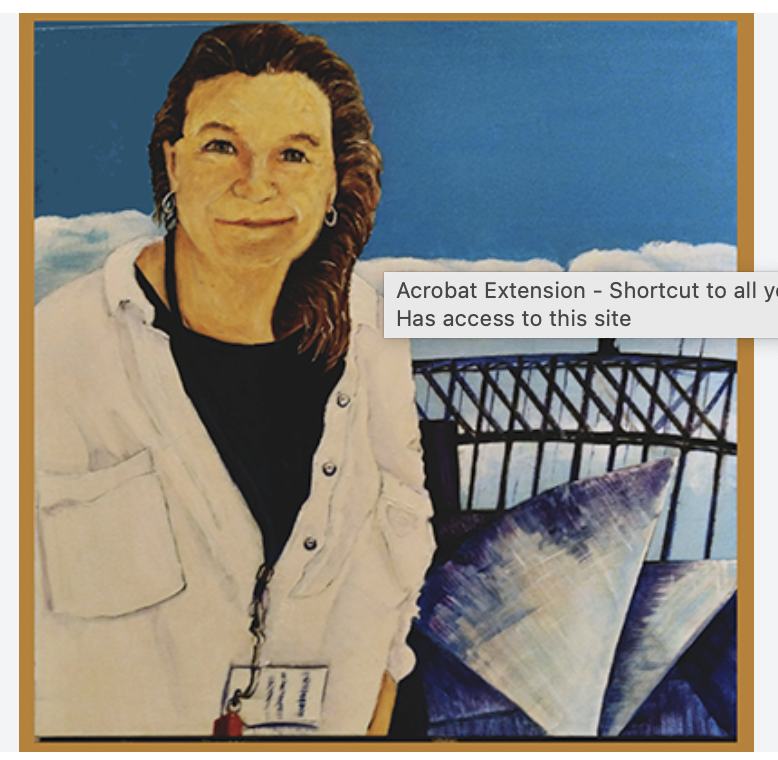 Vivid Sydney is an annual celebration of creativity, innovation and technology, transforming Sydney for 23 days and nights. The idea behind the Festival is to fuse art, innovation and technology in collaboration with some of our time's most boundary-pushing artists, thinkers, musicians and culinary experts. This iconic Vivid Festival began in 2009, and the most recent Vivid Festival in 2023 had an audience reach of 3.28 million. The Vivid Festival concept was created and is managed and produced by Destination NSW, the NSW Government's tourism and major events agency.
Vivid Sydney is an annual celebration of creativity, innovation and technology, transforming Sydney for 23 days and nights. The idea behind the Festival is to fuse art, innovation and technology in collaboration with some of our time's most boundary-pushing artists, thinkers, musicians and culinary experts. This iconic Vivid Festival began in 2009, and the most recent Vivid Festival in 2023 had an audience reach of 3.28 million. The Vivid Festival concept was created and is managed and produced by Destination NSW, the NSW Government's tourism and major events agency.
Shanon Steele @ Opera on the Harbour
During this conversation, Joyce Steele from Canberra said,
It is about beauty too. All a bit overwhelming. The best one was when we went on a cruise and saw it from the water. You miss some of the stuff that isn’t on Circular Quay but it was much more pleasant and relaxed.
References
These sources are readily available online
Encyclopaedia Britannica. (Accessed Dec. 2023) Sydney Opera House. https://www.britannica.com/topic/Sydney-Opera-House
Inflationtool.com
The Sydney Opera House. (Accessed Dec. 2023) Our story Jørn Utzon AC. https://www.sydneyoperahouse.com/our-story/jorn-utzon
Vivid Sydney (About) (Accessed Dec. 2023). About Vivid Sydney. https://www.vividsydney.com/info/about-vivid-sydney
Wikipedia (Accessed Dec. 2023) Vivid Sydney. https://en.wikipedia.org/wiki/Vivid_Sydney
You might also like
Cunnamulla - Premium Destination OutbackThe area can be hot dry and dusty, but water is available from artesian bores...
Synergy of the Cunnamulla Hot Springs and the River Lights Fes...Paul Harper Green, General Manager of the Cunnamulla Hot Springs, explains ho...
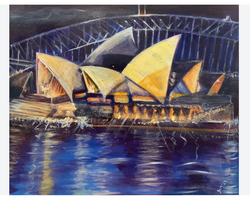

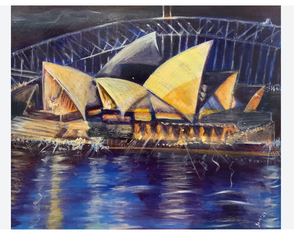




 As We Age - We React to Life's Challenges Differentlyon 03/16/2024
As We Age - We React to Life's Challenges Differentlyon 03/16/2024
 Organic Gardening - Cunnamulla Styleon 03/08/2024
Organic Gardening - Cunnamulla Styleon 03/08/2024
 Cunnamulla - Premium Destination Outbackon 12/17/2023
Cunnamulla - Premium Destination Outbackon 12/17/2023
 OpenAI and Watermarkson 02/06/2024
OpenAI and Watermarkson 02/06/2024
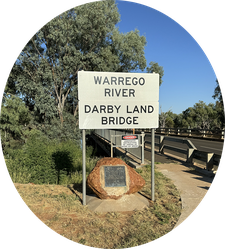
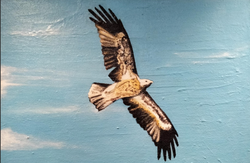
Comments
In Australia, we just drop our letters and shorten things.
If I want you to come with me, I say "Comin' with?"
Thank you!
Wouldn't it be funny if it started out that botanical was the correct, original term and that botanic was its synonym because of the last two letters falling off one of those billboard-like signs with removable letters in high winds or rains?
I researched this question - and then forgot to come back and answer! I think they are just interchangeable terms! Thanks for the question. You make me think Derdriu
Thank you for the link! There's such a diversity of achievements and activities and non-woody and woody plants.
The following is a somewhat related, somewhat unrelated question about name and word choice.
Sometimes a garden title on the order of the Royal Botanic Gardens makes the adjective botanic, other times botanical.
Might the Royal Botanic Gardens be so-called because their mustering up royalty and might non-royal equivalents be presented as botanical gardens?
Royal Botanic Gardens. https://www.botanicgardens.org.au/#
I love these gardens.
Thank you!
Your answer, in the comment box immediately below this one, to my previous question notes that Opera on the Harbour "is through the parkland and it looks over the water to the Opera House."
Online sources offer nothing about parkland. Would parkland be a private or public entity?
It was because it was designed so that the concert overlooks the water. When I have been to concerts there, the performers are often in front of the water. Great photo shoot opportunities. The steps make good seats.
https://opera.org.au/productions/west...
On another note Opera on the Harbour is awesome too. It is through the parkland and it looks over the water to the Opera House. Click the link and you can see the image. I will go with my sster and my niece 2024.
The third paragraph to the first subheading, Who designed the Opera House?, considers that "On the southeastern end of the Opera House, there is a space where outdoor performances happen."
Is that space amenable to outdoor performances because of the original design or because of building and ground adaptations?
It is worth it. You would be surprised too - if you ever got to go behind the scenes to see all the drawings that designers have done over the years. I was dumbstruck.
It is worth it. You would be surprised too - if you ever got to go behind the scenes to see all the drawings that designers have done over the years. I was dumbstruck.